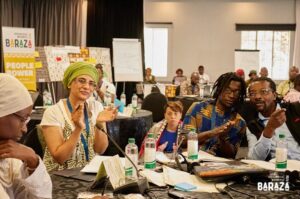By Ogo Chukwudi and Rachel Gyabaah
In today’s rapidly evolving world, social movements have become one of the most dynamic forces for transformative change, especially in addressing governance, equity, environmental justice, and economic exclusion.
Though the term “social movement” gained global prominence during the civil rights and anti-colonial struggles of the 20th century, the practice has deep roots in Africa’s history of community resistance, solidarity, and self-determination. Social movements have been used for decades as a collective action to challenge the status quo and push for systemic reforms.
Their relevance has only grown in our interconnected and digitally enabled era. Movements like #FeesMustFall, #EndSars and #EndFinanceBill demonstrate how digital tools ranging from Twitter and TikTok to virtual organizing spaces have transformed local protests into powerful, continent-wide calls for change.
The 2025 African Social Movements Baraza builds on this legacy, serving as a platform where digital activism and on-the-ground strategies converge to amplify Africa’s demand for justice and systemic transformation.
Social movements are distinct in that they emerge organically, led by everyday people fueled by shared values and urgent demands for justice. Unlike conventional advocacy, which often relies on formal structures, social movements are fluid, people-centred, and grounded in the lived realities of communities.
They are accessible and empowering, particularly for youth, women, and marginalised groups frequently excluded from institutional decision-making spaces. A defining strength of social movements lies in their flexibility. Unlike formalized structures bound by bureaucracy, social movements are agile, adapting swiftly to grassroots needs.
During Nigeria’s #EndSars protest, for example, when the government blocked access to funds in traditional banks, protesters used Bitcoin to mobilize resources, organizing nationwide demonstrations and bypassing government crackdowns. Likewise, during the 2024 anti-finance bill protests in Kenya, M-Changa, a local crowdfunding platform, played a key role in supporting protesters and their families, demonstrating how alternative tools can sustain resistance and solidarity in the face of institutional pressure.
Across Africa, we have seen how movements have shaped national conversations and catalysed meaningful change. Youth-led protests in Nigeria (#EndSARS), mass mobilisations in Kenya around exploitative financial bills, and ongoing citizen action in Sudan and South Africa all point to a renewed civic awakening.
In Ghana, the powerful demonstrations against galamsey (illegal mining) by civil society groups, environmental activists, and local communities have spotlighted the environmental devastation and governance failures plaguing natural resource management.
These movements share a common theme: the fusion of offline courage and online mobilisation, they have raised awareness and forced governments and corporations to account for their actions. These changes have shown the extraordinary impact of social movements. They are beacons of hope, offering new pathways for civic participation, democratic renewal, and social justice.
And yet, despite their legitimacy, social movements are often misunderstood. They are too frequently branded as chaotic or disruptive, and in many contexts, movement leaders face harassment, criminalisation, or even violence. But far from being anarchic, social movements are deeply democratic.
They are spaces of collective imagination where people build solidarity, reimagine the future, and co-create pathways toward justice. Consider Sudan’s 2019 revolution, where the Sudanese Professionals Association, a coalition of unions and activists, used non-violent resistance and inclusive dialogue to topple a dictatorship. Their success underscores how movements can be both disruptive and democratically rigorous.
TrustAfrica recognizes the transformative potential of social movements in reclaiming agency and reshaping Africa’s development narrative and has consistently used its convening power to support collective organizing and foster critical conversations on the continent. Through partnerships, thought leadership, and grantmaking, we have stood with communities and movements pushing for inclusive development, equitable resource governance, and accountable leadership.
This year’s African Social Movements (ASM) Baraza is more than a convening; it’s a bold, creative space where activists, artists, organizers, and changemakers across Africa come together to reflect, strategize, and build coalitions for change. From shrinking civic space to environmental justice and extractive governance, the Baraza centers African voices and lived experiences.
It celebrates the resilience of our movements and offers tools and networks to amplify their impact. As traditional systems fall short, social movements present a vital path forward, and TrustAfrica remains committed to supporting its bold work toward a just, inclusive, and sustainable future.
Importantly, the ASM Baraza 2025 will spotlight the transformative power of art and culture in social movements. From music and poetry to cultural displays and murals, art has always been a potent language of change and a vessel for collective memory and hope.
The Baraza will harness these creative expressions to challenge dominant narratives, inspire civic action, and galvanize support for the issues that matter most, from land justice and climate resilience to democratic renewal and inclusive economies.
By weaving together dialogue, activism, and artivism, the ASM Baraza will celebrate Africa’s movements while reigniting the spirit of Ubuntu and reminding us that we are the architects of a more just, vibrant, and sustainable future. Join us to honour the past, mobilize the present, and co-create a future where justice is not just demanded but designed. What role can you play?










